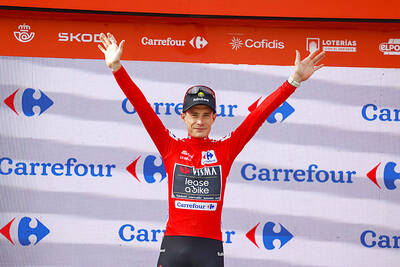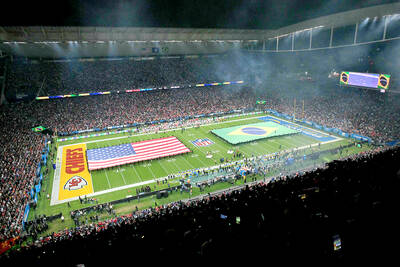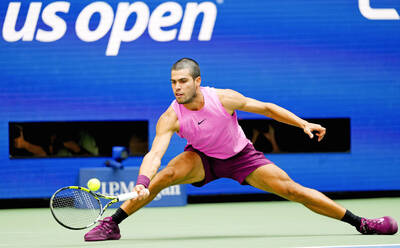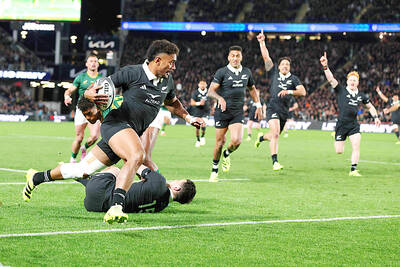Death threats and insults: Homophobia remains omnipresent in Spain’s sacred soccer world, where players do not dare “come out” in an otherwise gay-friendly country, whose capital is hosting the WorldPride until Sunday.
“First, they refused to take their showers with me,” said Jose Manuel Garoz, who was sidelined from his amateur local team in his teens when his teammates found out he was gay via social media networks.
“They provoked me all the time and we argued. We came to blows and the president decided to kick me out,” the young man, now 22, said as he stood next to a soccer pitch where he now plays in a “gay-friendly” Madrid club, GMadrid Sports.
A world leader in lesbian, gay, bisexual, and transgender (LGBT) rights, Spain became the third country to authorize gay marriage in 2005 and Madrid is now hosting WorldPride, one of the biggest celebrations of LGBT rights.
However, homosexuality remains a taboo in the professional soccer world.
“With around 8 percent of the population gay and lesbian, it’s not normal at all that there are no overtly gay players,” Spain’s Observatory against Homophobia president Paco Ramirez said.
He believes this is because they fear it would “affect their career.”
“For a player to dare come out under these circumstances, there is no assurance that sponsors won’t drop him,” said Julien Pontes of the French Rouge Direct collective, which fights against homophobia in soccer.
Spanish sporting authorities said they are fighting against discrimination.
For instance, every weekend the Spanish La Liga details all insults shouted in stadiums.
Just several months ago, La Liga president Javier Tebas said that the league “would not allow any bad-mouthing from a co-player, the public, the media” if a soccer player revealed he was gay.
The clubs also promise they would support any player wanting to come out.
“If someone wants to freely express his homosexuality, there is no constraint in our club,” a management source at Barcelona said.
“If I were homosexual, I would say so. Even if it’s easier to say this when you’re not,” Atletico Madrid’s French star Antoine Griezmann told men’s magazine Icon.
However, despite this, no player has taken that step.
“In the football world, homophobia is everywhere,” said Jesus Tomillero, a referee who has been the victim of death threats for denouncing homophobic insults aimed at him.
“People think that football is for machos, that a gay man can dirty this image,” the 22-year-old said.
Homophobic insults are common in Spain’s stadiums, used to discredit opponents regardless of their alleged or actual sexual orientation.
Several generations of players have been on the receiving end, from Spain’s former midfielder Guti to Real Madrid’s star striker Cristiano Ronaldo, as well as coach Pep Guardiola.
The rival is a maricon (“faggot”), whoever he might be.
“Why don’t we condemn this? The referee doesn’t write it up in his match report. There is inaction from all those involved in the sport,” said Ruben Lopez, in charge of sporting issues at the Spanish LGBT Federation.
Last year, the Spanish Ministry of the Interior reported 92 hate crimes — including homophobic acts — committed in sporting facilities.
Acts targeting LGBT are not counted separately and a parliamentary initiative seeking to specifically include gays and lesbians in a law against intolerance in sports has yet to be adopted.

Jonas Vingegaard on Tuesday claimed the overall Vuelta a Espana lead while Jay Vine earned the stage 10 victory for his second triumph of the race. Two-time Tour de France winner Vingegaard overhauled Torstein Traen’s lead to head the general classification by 26 seconds from the Norwegian, with Joao Almeida third and trailing the Dane by 38 seconds. Vine put in an unmatchable performance on the final climb to finish ahead of Spanish Movistar riders Pablo Castrillo and Javier Romo. “Back in red, I’m happy with it, it’s a beautiful jersey,” Vingegaard said. “I’m happy with how the day went,

The Kansas City Chiefs wrapped up a brief visit to Brazil on Friday with a season-opening loss to the Los Angeles Chargers, but despite the defeat, the team outshone their divisional rivals in the fight for the hearts and minds of Brazilian fans. In Sao Paulo for just the second-ever NFL game in the city, Chiefs players — especially quarterback Patrick Mahomes and tight end Travis Kelce — were treated as major celebrities throughout their stay, turning Corinthians Arena into a scene reminiscent of the Chiefs’ Arrowhead Stadium. Before kickoff, crowds of fans gathered around the Chiefs’ tunnel, eager to catch a

RIVALRY: Carlos Alcaraz lost his previous two matches against Serbia’s Novak Djokovic, in the Australian Open quarter-finals this year and Paris Olympics final last year Spain’s Carlos Alcaraz on Tuesday dazzled at the US Open to make the semi-finals before Novak Djokovic of Serbia danced his way through to book a New York showdown with the Spaniard that would mark the latest chapter in their generational rivalry. Former champion Alcaraz produced yet another entertaining display at Flushing Meadows to dismantle 20th seed Jiri Lehecka 6-4, 6-2, 6-4 at a sunbathed Arthur Ashe Stadium, securing his place in the last four without dropping a set this year. “Sometimes I play a shot that I should not play in that moment, but it’s the way I love

New Zealand stayed firm at their Eden Park fortress to claim an attritional 24-17 win over South Africa in a heavyweight clash between the world’s top two rugby sides yesterday. Under pressure after conceding a first-ever defeat on Argentine soil against the Pumas two weeks ago, the All Blacks responded with a performance of grit and discipline to stretch their unbeaten run at their Auckland stronghold to 51 matches. Two well-taken tries by Emoni Narawa and Will Jordan set up a 14-3 lead at halftime before Quinn Tupaea grabbed a third five-pointer for the hosts 13 minutes from time. Well-held for most of